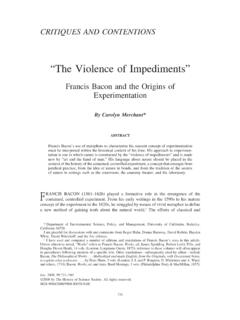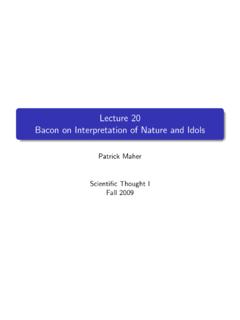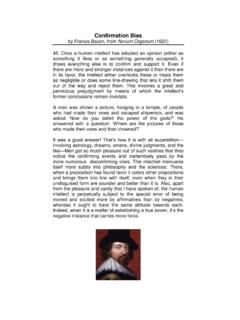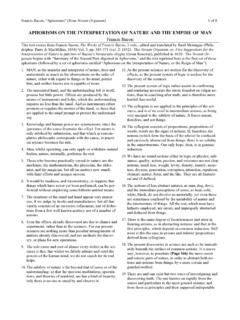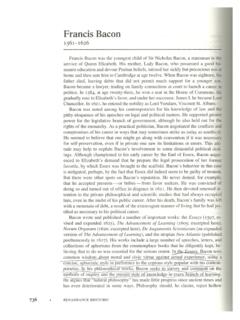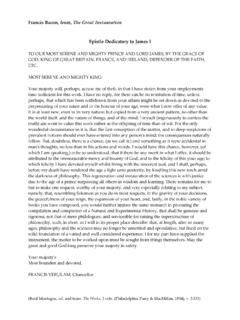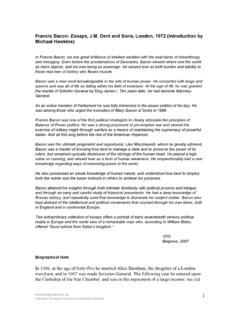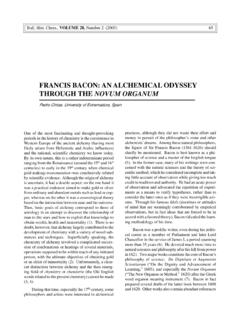Transcription of Francis Bacon || Of Truth 1 Certainly there be, that delight
1 English 1302: Composition II /1 Francis Bacon || Of Truth What is Truth ? said jesting Pilate1, and would not stay for an answer. Certainly there be, that delight in giddiness, and count it a bondage to fix a belief; affecting free-will in thinking, as well as in acting. And though the sects of philosophers of that kind be gone2, yet there remain certain discoursing3 wits, which are of the same veins, though there be not so much blood in them, as was in those of the ancients. But it is not only the difficulty and labor, which men take in finding out of Truth , nor again, that when it is found, it imposeth upon men's thoughts, that doth bring lies in favor; but a natural though corrupt love, of the lie itself.
2 One of the later school of the Grecians4, examineth the matter, and is at a stand, to think what should be in it, that men should love lies; where neither they make for pleasure, as with poets, nor for advantage, as with the merchant; but for the lie's sake. But I cannot tell; this same Truth , is a naked, and open day-light, that doth not show the masks, and mummeries, and triumphs, of the world, half so stately and daintily as candle-lights. Truth may perhaps come to the price of a pearl, that showeth best by day; but it will not rise to the price of a diamond, or carbuncle, that showeth best in varied lights.
3 A mixture of a lie doth ever add pleasure. [Therefore] Doth any man doubt, that if there were taken out of men's minds, vain opinions, flattering hopes, false valuations, imaginations as one would, and the like, but it would leave the minds, of a number of men, poor shrunken things, full of melancholy and indisposition, and unpleasing to themselves? One of the Fathers, in great severity, called poesy5 vinum doemonum6, because it filleth the imagination; and yet, it is but with the shadow of a lie. But it is not the lie that passeth through the mind, but the lie that sinketh in, and settleth in it, that doth the hurt; such as we spake of before.
4 But, howsoever these things are thus in men's depraved judgments, and affections, yet Truth , which only doth judge itself, teacheth that the inquiry of Truth , which is the love-making, or wooing of it, the knowledge of Truth , which is the presence of it, and the belief of Truth , which is the enjoying of it, is the sovereign good of human nature. The first creature of God, in the works of the days, was the light of the sense; the last, was the light of reason; and his sabbath work ever since, is the illumination of his Spirit. First he breathed light, upon the face of the matter or chaos; then he breathed light, into the face of man; and still he breatheth and inspireth light, into the face of his chosen.
5 The poet7, that beautified the sect8, that was otherwise inferior to the rest, saith yet excellently well: It is a pleasure, to stand upon the shore, and to see ships tossed upon the sea; a pleasure, to stand in the window of a castle, and to see a battle, and the adventures thereof below: but no pleasure is comparable to the standing upon the vantage ground of Truth (a hill not to be commanded, and where the air is always clear and serene), and to see the errors, and wanderings, and mists, and tempests, in the vale below; so always that this prospect be with pity, and not with swelling, or pride.
6 Certainly , it is heaven upon earth, to have a man's mind move in charity, rest in providence, and turn upon the poles of Truth . general specifics English 1302: Composition II /2 To pass from theological, and philosophical Truth , to the Truth of civil business; it will be acknowledged, even by those that practise it not, that clear, and round dealing, is the honor of man's nature; and that mixture of falsehoods, is like alloy in coin of gold and silver, which may make the metal work the better, but it embaseth it. For these winding, and crooked courses, are the goings of the serpent; which goeth basely upon the belly, and not upon the feet.
7 there is no vice, that doth so cover a man with shame, as to be found false and perfidious. And therefore Montaigne9 saith prettily, when he inquired the reason, why the word of the lie should be such a disgrace, and such an odious charge, saith he, If it be well weighed, to say that a man lieth, is as much to say, as that he is brave [boastful] towards God, and a coward towards men; for a lie faces God, and shrinks from man. 10 Surely the wickedness of falsehood, and breach of faith, cannot possibly be so highly expressed, as in that it shall be the last peal, to call the judgments of God upon the generations of men; it being foretold, that when Christ cometh, he shall not find faith upon the _____ Bacon , Francis .
8 Of Truth . The Essays of Francis Bacon . Ed. Mary Augusta Scott, PhD. New York: Scribner s, 1908. PDF file. 1 Pilate: reference to the judgment of Christ in the New Testament (notice Bacon closes his argument with an allusion to Christ as well) 2 philosophers of that kind be gone: refers to the Ancient Philosophers known as The Skeptics, the first being Pyrrho (360 BCE-270 CBE) which asserts nothing of this world can be truly understood in full. Basic perceptions of humans may be in misguided. No object can be confirmed as real or true. 3 discoursing: rambling 4 later school of the Grecians: that is, Lucian 5 poesy: that is, poetry or fictional verse 6 vinum doemonum: wine of the devils; from the writings of Saint Augustine (354-430); an early Christian philosopher 7 Lucretius (99 BCE-55 BCE) author of On the Nature of Things, which discusses Epicurean beliefs 8 Epicureans disliked notions of superstition and divine interventions; believed one should live life to the fullest; individual pleasures are the main goal in life.
9 Follows hedonistic concepts 9 Michel de Montaigne (1533-1592): popularized the genre of the personal essay 10 This quote is taken directly from a Montaigne work: Essays of Michel de Montaigne, Book II. chap, xviii. Of Giving the Lie. 11 Bacon paraphrases a passage from the New Testament of the Holy Bible, Luke 18:8: I tell you that he will avenge them speedily. Nevertheless when the Son of man cometh, shall he find faith on the earth? Notice Bacon s use of dropping classical allusions and authoritative writers to show his education. Also notice he cites sources both Pagan and Christian-based as authoritative resources.
10


